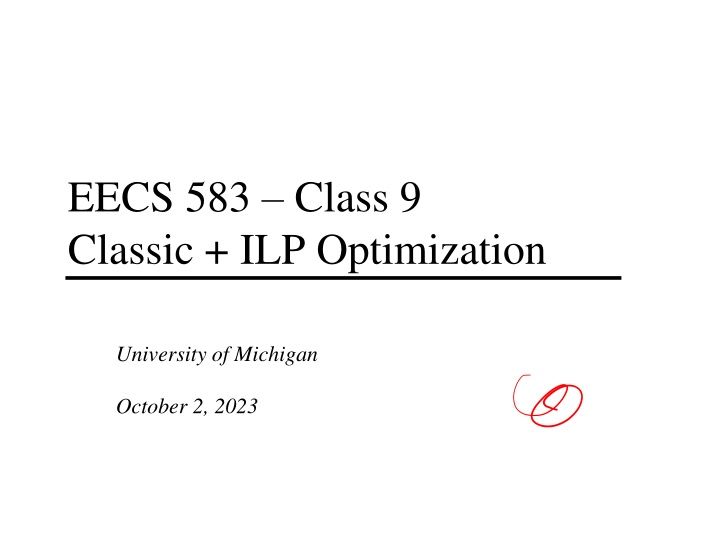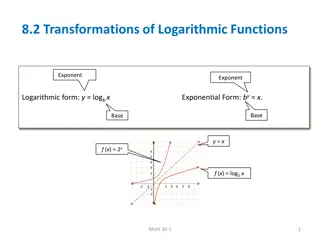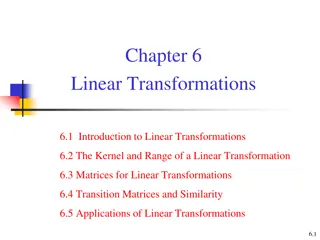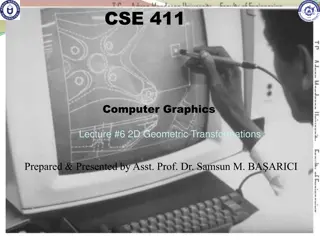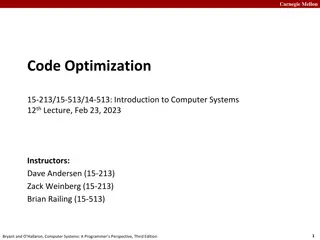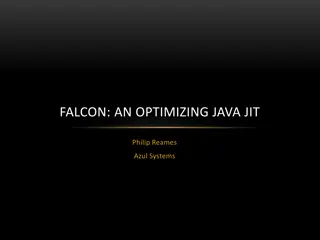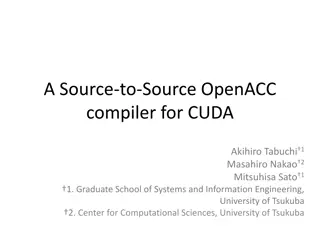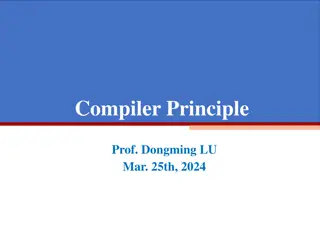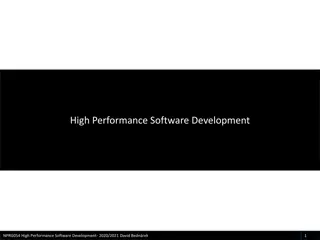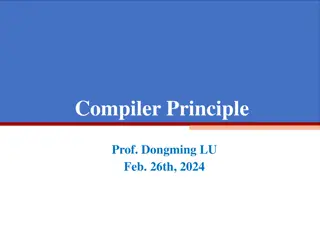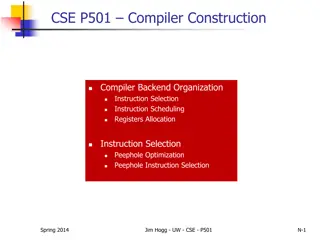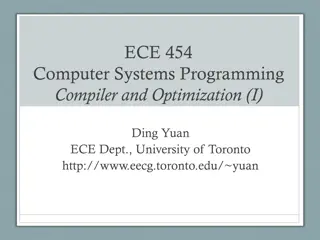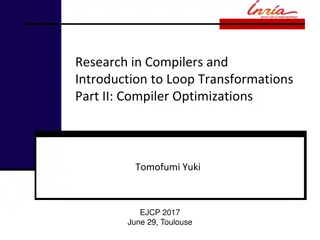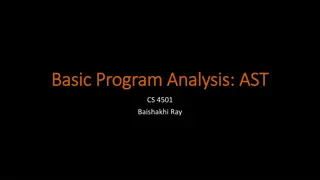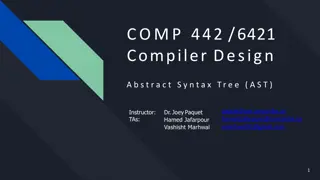Compiler Code Transformations for High-Performance Systems
Dive into the world of compiler code transformations for superscalar-based high-performance systems. Explore research papers and discussions on machine description-driven compilers for EPIC processors, uncovering insights on optimizing performance and efficiency in computer systems. Find inspiration for your course project as you navigate through a semester filled with learning and project milestones.
Download Presentation

Please find below an Image/Link to download the presentation.
The content on the website is provided AS IS for your information and personal use only. It may not be sold, licensed, or shared on other websites without obtaining consent from the author.If you encounter any issues during the download, it is possible that the publisher has removed the file from their server.
You are allowed to download the files provided on this website for personal or commercial use, subject to the condition that they are used lawfully. All files are the property of their respective owners.
The content on the website is provided AS IS for your information and personal use only. It may not be sold, licensed, or shared on other websites without obtaining consent from the author.
E N D
Presentation Transcript
EECS 583 Class 9 Classic + ILP Optimization University of Michigan October 2, 2023
Announcements & Reading Material Lecture schedule this week Makeup lecture on Wednes, 10:30-12 on Zoom Regular Friday lecture, may need to adjust time (will announce on Wednes) Hopefully everyone is making some progress on HW 2 Due Oct 13 Today s class Compiler Code Transformations for Superscalar-Based High- Performance Systems, S. Mahlke, W. Chen, J. Gyllenhaal, W. Hwu, P, Chang, and T. Kiyohara, Proceedings of Supercomputing '92, Nov. 1992, pp. 808-817 Next class (code generation) Machine Description Driven Compilers for EPIC Processors , B. Rau, V. Kathail, and S. Aditya, HP Technical Report, HPL- 98-40, 1998. (long paper but informative) - 1 -
Course Project Time to Start Thinking About This Mission statement: Design and implement something interesting in a compiler LLVM preferred, but others are fine Groups of 3-5 people (other group sizes are possible in some cases) Extend existing research paper or go out on your own Topic areas (Not in any priority order) Automatic parallelization/SIMDization High level synthesis/FPGAs Approximate computing Memory system optimization Reliability Energy Security Dynamic optimization Machine learning for compilers Optimizing for GPUs - 2 -
Course Projects Timetable Now - Start thinking about potential topics, identify group members Use piazza to recruit group members Oct 23-27: Project proposal discussions, No class Oct 23/27, Regular class resumes Mon Oct 30 Aditya, Tarun and I will meet with each group virtually for 5-10 mins, slot signups the week before, Oct 13-16 Ideas/proposal discussed at meeting don t come into the meeting with too many ideas (1-2 only) Short written proposal (a paragraph plus 1-2 references) due Mon, Oct 30 from each group, submit via email Nov 6 End of semester: Research presentations (details later) Each group presents a research paper related to their project (15 mins) Late Nov - Optional quick discussion with groups on progress Dec 6 - 13: Project demos Each group, 15 min slot - Presentation/Demo/whatever you like Turn in short report on your project - 3 -
Sample Project Ideas (Traditional) Memory system Cache profiler for LLVM IR miss rates, stride determination Data cache prefetching, cache bypassing, scratch pad memories Data layout for improved cache behavior Advanced loads move up to hide latency Control/Dataflow optimization Superblock formation Make an LLVM optimization smarter with profile data Implement optimization not in LLVM Reliability AVF profiling, vulnerability analysis Selective code duplication for soft error protection Low-cost fault detection and/or recovery Efficient soft error protection on GPUs/SIMD - 4 -
Sample Project Ideas (Traditional cont) Energy Minimizing instruction bit flips Deactivate parts of processor (FUs, registers, cache) Use different processors (e.g., big.LITTLE) Security/Safety Efficient taint/information flow tracking Automatic mitigation methods obfuscation for side channels Preventing control flow exploits Rule compliance checking (driving rules for AV software) Run-time safety verification Dealing with pointers Memory dependence analysis try to improve on LLVM Using dependence speculation for optimization or code reordering - 5 -
Sample Project Ideas (Parallelism) Optimizing for GPUs Dumb OpenCL/CUDA smart OpenCL/CUDA selection of threads/blocks and managing on-chip memory Reducing uncoalesced memory accesses measurement of uncoalesced accesses, code restructuring to reduce these Matlab CUDA/OpenCL Kernel partitioning, data partitioning across multiple GPUs Parallelization/SIMDization DOALL loop parallelization, dependence breaking transformations DSWP parallelization Access-execute program decomposition Automatic SIMDization, Superword level parallelism - 6 -
More Project Ideas Dynamic optimization (Dynamo, LLVM, Dalvik VM) Run-time DOALL loop parallelization Run-time program analysis for reliability/security Run-time profiling tools (cache, memory dependence, etc.) Binary optimizer Arm binary to LLVM IR, de-register allocation High level synthesis Custom instructions - finding most common instruction patterns, constrained by inputs/outputs Int/FP precision analysis, Float to fixed point Custom data path synthesis Customized memory systems (e.g., sparse data structs) - 7 -
And Yet a Few More Approximate computing New approximation optimizations (lookup tables, loop perforation, tiling) Impact of local approximation on global program outcome Program distillation - create a subset program with equivalent memory/branch behavior Machine learning for compilers Using ML/search to guide optimizations (e.g., unroll factors) Using ML/search to guide optimization choices (which optis/order) Be careful with low compiler content!! Remember, don t be constrained by my suggestions, you can pick other topics! - 8 -
Back to Code Optimization Classical (machine independent, done at IR level) Reducing operation count (redundancy elimination) Simplifying operations Generally good for any kind of machine We went through Dead code elimination Constant propagation Constant folding Copy propagation CSE LICM - 9 -
Global Variable Migration Assign a global variable temporarily to a register for the duration of the loop Load in preheader Store at exit points Rules X is a load or store address(X) not modified in the loop if X not executed on every iteration, then X must provably not cause an exception All memory ops in loop whose address can equal address(X) must always have the same address as X BB1 BB2 1. r4 = load(r5) 2. r4 = r4 + 1 BB4 BB3 3. r8 = load(r5) 4. r7 = r8 * r4 5. store(r5, r4) BB5 6. store(r5,r7) BB6 - 10 -
Global Variable Migration Example BB1 BB2 1. r4 = load(r5) 2. r4 = r4 + 1 BB4 BB3 3. r8 = load(r5) 4. r7 = r8 * r4 5. store(r5, r4) BB5 6. store(r5,r7) BB6 - 11 -
Induction Variable Strength Reduction Create basic induction variables from derived induction variables Induction variable BIV (i++) 0,1,2,3,4,... DIV (j = i * 4) 0, 4, 8, 12, 16, ... DIV can be converted into a BIV that is incremented by 4 Issues Initial and increment vals Where to place increments BB1 1. r5 = r4 - 3 2. r4 = r4 + 1 BB2 BB3 BB4 3. r7 = r4 * r9 4. r6 = r4 << 2 BB5 BB6 - 12 -
Induction Variable Strength Reduction (2) Rules Transformation Insert the following into the preheader new_reg = RHS(X) If opcode(X) is not add/sub, insert to the bottom of the preheader new_inc = inc(src1(X)) opcode(X) src2(X) else new_inc = inc(src1(X)) Insert the following at each update of src1(X) new_reg += new_inc Change X dest(X) = new_reg BB1 X is a *, <<, + or operation src1(X) is a basic ind var src2(X) is invariant No other ops modify dest(X) dest(X) != src(X) for all srcs dest(X) is a register 1. r5 = r4 - 3 2. r4 = r4 + 1 BB2 BB3 BB4 3. r7 = r4 * r9 4. r6 = r4 << 2 BB5 BB6 - 13 -
Induction Variable Strength Reduction - Example BB1 1. r5 = r4 - 3 2. r4 = r4 + 1 BB2 BB3 BB4 3. r7 = r4 * r9 4. r6 = r4 << 2 BB5 BB6 - 14 -
Class Problem Optimize this applying induction var str reduction 1. r1 = 0 2. r2 = 0 BB1 3. r5 = r5 + 1 4. r11 = r5 * 2 5. r10 = r11 + 2 6. r12 = load (r10+0) 7. r9 = r1 << 1 8. r4 = r9 - 10 9. r3 = load(r4+4) 10. r3 = r3 + 1 11. store(r4+0, r3) 12. r7 = r3 << 2 13. r6 = load(r7+0) 14. r13 = r2 - 1 15. r1 = r1 + 1 16. r2 = r2 + 1 BB2 r13, r12, r6, r10 liveout BB3 - 15 -
Class Problem Solution r1 = 0 r2 = 0 r111 = r5 * 2 r109 = r1 << 1 r113 = r2 -1 Optimize this applying induction var str reduction r1 = 0 r2 = 0 r5 = r5 + 1 r111 = r111 + 2 r11 = r111 r10 = r11 + 2 r12 = load (r10+0) r9 = r109 r4 = r9 - 10 r3 = load(r4+4) r3 = r3 + 1 store(r4+0, r3) r7 = r3 << 2 r6 = load(r7+0) r13 = r113 r1 = r1 + 1 r109 = r109 + 2 r2 = r2 + 1 r113 = r113 + 1 Note, after copy propagation, r10 and r4 can be strength reduced as well. r5 = r5 + 1 r11 = r5 * 2 r10 = r11 + 2 r12 = load (r10+0) r9 = r1 << 1 r4 = r9 - 10 r3 = load(r4+4) r3 = r3 + 1 store(r4+0, r3) r7 = r3 << 2 r6 = load(r7+0) r13 = r2 - 1 r1 = r1 + 1 r2 = r2 + 1 r13, r12, r6, r10 liveout - 16 - r13, r12, r6, r10 liveout
ILP Optimization Traditional optimizations Redundancy elimination Reducing operation count ILP (instruction-level parallelism) optimizations Increase the amount of parallelism and the ability to overlap operations Operation count is secondary, often trade parallelism for extra instructions (avoid code explosion) ILP increased by breaking dependences True or flow = read after write dependence False or (anti/output) = write after read, write after write - 17 -
Back Substitution Generation of expressions by compiler frontends is very sequential Account for operator precedence Apply left-to-right within same precedence Back substitution Create larger expressions Iteratively substitute RHS expression for LHS variable Note may correspond to multiple source statements Enable subsequent optis Optimization Re-compute expression in a more favorable manner y = a + b + c d + e f; 1. r9 = r1 + r2 2. r10 = r9 + r3 3. r11 = r10 - r4 4. r12 = r11 + r5 5. r13 = r12 r6 Subs r12: r13 = r11 + r5 r6 Subs r11: r13 = r10 r4 + r5 r6 Subs r10 r13 = r9 + r3 r4 + r5 r6 Subs r9 r13 = r1 + r2 + r3 r4 + r5 r6 - 18 -
Tree Height Reduction original: r9 = r1 + r2 r10 = r9 + r3 r11 = r10 - r4 r12 = r11 + r5 r13 = r12 r6 Re-compute expression as a balanced binary tree Obey precedence rules Essentially re-parenthesize Combine literals if possible Effects Height reduced (n terms) n-1 (assuming unit latency) ceil(log2(n)) Number of operations remains constant Cost Temporary registers live longer Watch out for Always ok for integer arithmetic Floating-point may not be!! after back subs: r13 = r1 + r2 + r3 r4 + r5 r6 r1 + r2 r3 r4 r5 r6 final code: t1 = r1 + r2 t2 = r3 r4 t3 = r5 r6 t4 = t1 + t2 r13 = t4 + t3 + + r13 - 19 -
Class Problem Assume: + = 1, * = 3 operand arrival times 0 r1 0 r2 0 r3 1 r4 2 r5 0 r6 1. r10 = r1 * r2 2. r11 = r10 + r3 3. r12 = r11 + r4 4. r13 = r12 r5 5. r14 = r13 + r6 Back susbstitute Re-express in tree-height reduced form Account for latency and arrival times - 20 -
Loop Unrolling r1 = load(r2) r3 = load(r4) r5 = r1 * r3 r6 = r6 + r5 r2 = r2 + 4 r4 = r4 + 4 if (r4 >= 400) goto exit r1 = load(r2) r3 = load(r4) r5 = r1 * r3 r6 = r6 + r5 r2 = r2 + 4 r4 = r4 + 4 if (r4 >= 400) goto exit r1 = load(r2) r3 = load(r4) r5 = r1 * r3 r6 = r6 + r5 r2 = r2 + 4 r4 = r4 + 4 if (r4 < 400) goto loop loop: for (i=x; i< 100; i++) { sum += a[i]*b[i]; } iter1 unroll 3 times loop: r1 = load(r2) r3 = load(r4) r5 = r1 * r3 r6 = r6 + r5 r2 = r2 + 4 r4 = r4 + 4 if (r4 < 400) goto loop iter2 Unroll = replicate loop body n-1 times. iter3 Hope to enable overlap of operation execution from different iterations exit: - 21 -
Smarter Loop Unrolling with Known Trip Count r1 = load(r2) r3 = load(r4) r5 = r1 * r3 r6 = r6 + r5 r2 = r2 + 4 r4 = r4 + 4 r1 = load(r2) r3 = load(r4) r5 = r1 * r3 r6 = r6 + r5 r2 = r2 + 4 r4 = r4 + 4 r1 = load(r2) r3 = load(r4) r5 = r1 * r3 r6 = r6 + r5 r2 = r2 + 4 r4 = r4 + 4 loop: Want to remove early exit branches iter1 Trip count = 400/4 = 100 r4 = 0 r1 = load(r2) r3 = load(r4) r5 = r1 * r3 r6 = r6 + r5 r2 = r2 + 4 r4 = r4 + 4 if (r4 < 400) goto loop unroll multiple of trip count loop: iter2 iter3 r1 = load(r2) r3 = load(r4) r5 = r1 * r3 r6 = r6 + r5 r2 = r2 + 4 r4 = r4 + 4 if (r4 < 400) goto loop iter4 - 22 - exit:
What if the Trip Count is not Statically Known? for (i=0; i< ((400-r4)/4)%3; i++) { sum += a[i]*b[i]; } preloop loop: r1 = load(r2) r3 = load(r4) r5 = r1 * r3 r6 = r6 + r5 r2 = r2 + 4 r4 = r4 + 4 r1 = load(r2) r3 = load(r4) r5 = r1 * r3 r6 = r6 + r5 r2 = r2 + 4 r4 = r4 + 4 r1 = load(r2) r3 = load(r4) r5 = r1 * r3 r6 = r6 + r5 r2 = r2 + 4 r4 = r4 + 4 if (r4 < 400) goto loop Create a preloop to ensure trip count of unrolled loop is a multiple of the unroll factor iter1 r4 = ?? r1 = load(r2) r3 = load(r4) r5 = r1 * r3 r6 = r6 + r5 r2 = r2 + 4 r4 = r4 + 4 if (r4 < 400) goto loop loop: iter2 iter3 exit: - 23 -
Unrolling Not Enough for Overlapping Iterations: Register Renaming loop: loop: r1 = load(r2) r3 = load(r4) r5 = r1 * r3 r6 = r6 + r5 r2 = r2 + 4 r4 = r4 + 4 r1 = load(r2) r3 = load(r4) r5 = r1 * r3 r6 = r6 + r5 r2 = r2 + 4 r4 = r4 + 4 r1 = load(r2) r3 = load(r4) r5 = r1 * r3 r6 = r6 + r5 r2 = r2 + 4 r4 = r4 + 4 if (r4 < 400) goto loop r1 = load(r2) r3 = load(r4) r5 = r1 * r3 r6 = r6 + r5 r2 = r2 + 4 r4 = r4 + 4 r11 = load(r2) r13 = load(r4) r15 = r11 * r13 r6 = r6 + r15 r2 = r2 + 4 r4 = r4 + 4 r21 = load(r2) r23 = load(r4) r25 = r21 * r23 r6 = r6 + r25 r2 = r2 + 4 r4 = r4 + 4 if (r4 < 400) goto loop iter1 iter1 iter2 iter2 iter3 iter3 - 24 -
Register Renaming is Not Enough! Still not much overlap possible Problems r2, r4, r6 sequentialize the iterations Need to rename these 2 specialized renaming optis Accumulator variable expansion (r6) Induction variable expansion (r2, r4) loop: r1 = load(r2) r3 = load(r4) r5 = r1 * r3 r6 = r6 + r5 r2 = r2 + 4 r4 = r4 + 4 r11 = load(r2) r13 = load(r4) r15 = r11 * r13 r6 = r6 + r15 r2 = r2 + 4 r4 = r4 + 4 r21 = load(r2) r23 = load(r4) r25 = r21 * r23 r6 = r6 + r25 r2 = r2 + 4 r4 = r4 + 4 if (r4 < 400) goto loop iter1 iter2 iter3 - 25 -
Accumulator Variable Expansion r16 = r26 = 0 Accumulator variable x = x + y or x = x y where y is loop variant!! Create n-1 temporary accumulators Each iteration targets a different accumulator Sum up the accumulator variables at the end May not be safe for floating- point values loop: r1 = load(r2) r3 = load(r4) r5 = r1 * r3 r6 = r6 + r5 r2 = r2 + 4 r4 = r4 + 4 r11 = load(r2) r13 = load(r4) r15 = r11 * r13 r16 = r16 + r15 r2 = r2 + 4 r4 = r4 + 4 r21 = load(r2) r23 = load(r4) r25 = r21 * r23 r26 = r26 + r25 r2 = r2 + 4 r4 = r4 + 4 if (r4 < 400) goto loop r6 = r6 + r16 + r26 iter1 iter2 iter3 exit: - 26 -
Induction Variable Expansion r12 = r2 + 4, r22 = r2 + 8 r14 = r4 + 4, r24 = r4 + 8 Induction variable x = x + y or x = x y where y is loop invariant!! Create n-1 additional induction variables Each iteration uses and modifies a different induction variable Initialize induction variables to init, init+step, init+2*step, etc. Step increased to n*original step Now iterations are completely independent !! r16 = r26 = 0 loop: r1 = load(r2) r3 = load(r4) r5 = r1 * r3 r6 = r6 + r5 r2 = r2 + 12 r4 = r4 + 12 r11 = load(r12) r13 = load(r14) r15 = r11 * r13 r16 = r16 + r15 r12 = r12 + 12 r14 = r14 + 12 r21 = load(r22) r23 = load(r24) r25 = r21 * r23 r26 = r26 + r25 r22 = r22 + 12 r24 = r24 + 12 if (r4 < 400) goto loop r6 = r6 + r16 + r26 iter1 iter2 iter3 exit: - 27 -
Better Induction Variable Expansion r16 = r26 = 0 With base+displacement addressing, often don t need additional induction variables Just change offsets in each iterations to reflect step Change final increments to n * original step loop: r1 = load(r2) r3 = load(r4) r5 = r1 * r3 r6 = r6 + r5 iter1 r11 = load(r2+4) r13 = load(r4+4) r15 = r11 * r13 r16 = r16 + r15 iter2 r21 = load(r2+8) r23 = load(r4+8) r25 = r21 * r23 r26 = r26 + r25 r2 = r2 + 12 r4 = r4 + 12 if (r4 < 400) goto loop r6 = r6 + r16 + r26 iter3 exit: - 28 -
Homework Problem loop: loop: r1 = load(r2) r5 = r6 + 3 r6 = r5 + r1 r2 = r2 + 4 if (r2 < 400) goto loop r1 = load(r2) r5 = r6 + 3 r6 = r5 + r1 r2 = r2 + 4 r1 = load(r2) r5 = r6 + 3 r6 = r5 + r1 r2 = r2 + 4 r1 = load(r2) r5 = r6 + 3 r6 = r5 + r1 r2 = r2 + 4 if (r2 < 400) goto loop Optimize the unrolled loop Renaming Tree height reduction Ind/Acc expansion - 29 -
Homework Problem - Answer r16 = r26 = 0 loop: loop: loop: loop: r1 = load(r2) r5 = r6 + 3 r6 = r5 + r1 r2 = r2 + 4 if (r2 < 400) goto loop r1 = load(r2) r5 = r6 + 3 r6 = r5 + r1 r2 = r2 + 4 r1 = load(r2) r5 = r6 + 3 r6 = r5 + r1 r2 = r2 + 4 r1 = load(r2) r5 = r6 + 3 r6 = r5 + r1 r2 = r2 + 4 if (r2 < 400) goto loop r1 = load(r2) r5 = r1 + 3 r6 = r6 + r5 r11 = load(r2+4) r15 = r11 + 3 r16 = r16 + r15 r21 = load(r2+8) r25 = r21 + 3 r26 = r26 + r25 r2 = r2 + 12 if (r2 < 400) goto loop r6 = r6 + r16 r6 = r6 + r26 r1 = load(r2) r5 = r1 + 3 r6 = r6 + r5 r2 = r2 + 4 r11 = load(r2) r15 = r11 + 3 r6 = r6 + r15 r2 = r2 + 4 r21 = load(r2) r25 = r21 + 3 r6 = r6 + r25 r2 = r2 + 4 if (r2 < 400) goto loop Optimize the unrolled loop Renaming Tree height reduction Ind/Acc expansion after renaming and tree height reduction after acc and ind expansion - 30 -
